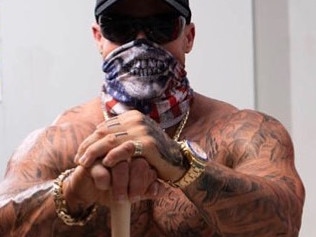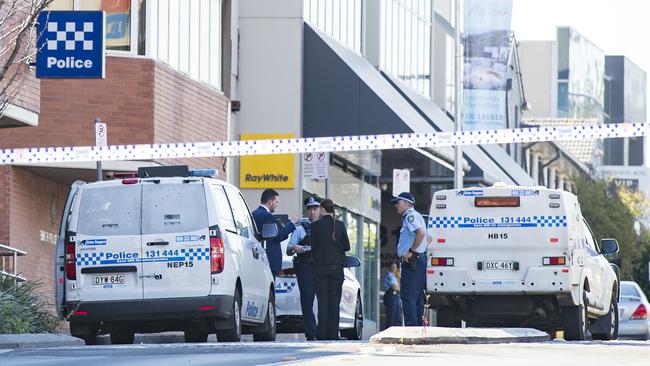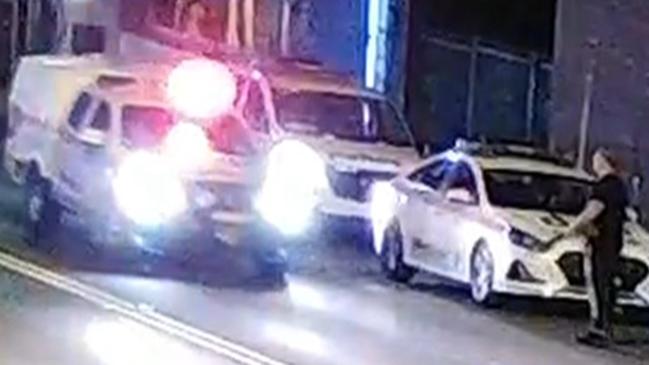Daniel King: Inquest into shooting rampage, death outside Penrith police station
Just before embarking on a shooting rampage, a former rugby league player told his mum he felt like “a man on fire”, an inquest heard. Read his mother’s heartbreaking testimony.
Penrith
Don't miss out on the headlines from Penrith. Followed categories will be added to My News.
The mum of a man who police shot 24 times after he embarked on a drug-fuelled shooting rampage said her son’s life had become “one of pain, suffering and immense frustration” after he suffered a stroke, an inquest heard.
On October 2, 2019, Daniel King, then aged 33, began his shooting rampage — first firing a shotgun outside the Marayong home of his partner, before heading to St Marys police station where he fired three more shots.
King then drove to Penrith police station where he was shot by police in a hail of bullets.
The inquest heard King, once a talented rugby league player, had his semi-professional career cut short by a stroke in 2010 and had suffered at least 10 concussions while playing.
After his death, an autopsy revealed King suffered from chronic traumatic encephalopathy (CTE) — a degenerative brain disease often associated with the large number of American football players who have developed it.

Speaking at the inquest into her son’s death, King’s mum, Sandra King, described her son as a man whose life was forever altered by the stroke he suffered,
“As a child, Daniel had a heart as big as Phar Lap,” Ms King said.

She told the inquest of her son, as a young boy, who sang with her in the back of the car on the way to work and loved to watch the Teenage Mutant Ninja Turtles.
King was also a child who excelled at sports from a young age — he received a black belt in martial arts, Allan Border noted his cricketing talent, and he represented Doonside athletics club in state level athletics as well as track and field, the inquest heard.
“(But) in high school all he wanted to do was play rugby,” Ms King said.
Ms King spoke at the inquest about the accident her son suffered when he was playing reserve grade rugby league for Penrith.

King was playing on the wing, when a tackle from an opposition player knocked him unconscious for two minutes, the inquest heard.
“He was then helped to his feet and he played,” Ms King said. “He later told me that for the entire first half he had no idea who he was playing for, so he would have to look at his shirt to remember”.
Ms King said her son was given a Panadol for his headache and was able to drive home at the end of the day.
“That evening he began to vomit … (and) by morning he couldn’t speak, couldn’t see and just appeared not to be present,” Ms King said.
After King was taken to hospital, they learnt he had suffered a stroke and he struggled to walk again, the inquest heard.
Ms King told the inquest when her son could eventually began building up his physical strength, he was “falling apart” on the inside.
“Just before Daniel passed, he came to see me … and said, ‘mum nobody understands because if they see me they think I look great but I’m really not … my eyesight’s going, my guts burn, I feel like I’m a man on fire’,” Ms King said.
She also told the inquest she received King’s CTP diagnosis posthumously, which was “a bittersweet experience” because it helped explain his change in personality but was also extremely distressing to learn of his severe torment.
Associate professor of neuropathology who delivered King’s CTP diagnosis, Michael Buckland, testified at the inquest earlier in the day.
Mr Buckland said King fell on the severe end of the spectrum.
“I believe it (CTE) would’ve started during King’s teenage years,” Mr Buckland said. “(And) I have no doubt that was part of the reason for his mood and behavioural changes.”
Mr Buckland told the inquest the severity of King’s CTE was roughly equivalent to that of NFL players Aaron Hernandez and Phillip Adams.
Hernandez, who was found dead in his cell, was convicted of murder posthumously, and Adams shot six people before turning the gun on himself.
Referencing both Hernandez and Adams, Mr Buckland told the inquest King’s shooting rampage could have been far worse.
“I don’t want to downplay the trauma to the police or his (King’s) partner but based on what we know from the US it could’ve been a lot worse,” Mr Buckland said.
The inquest at the NSW coroners court continues.




